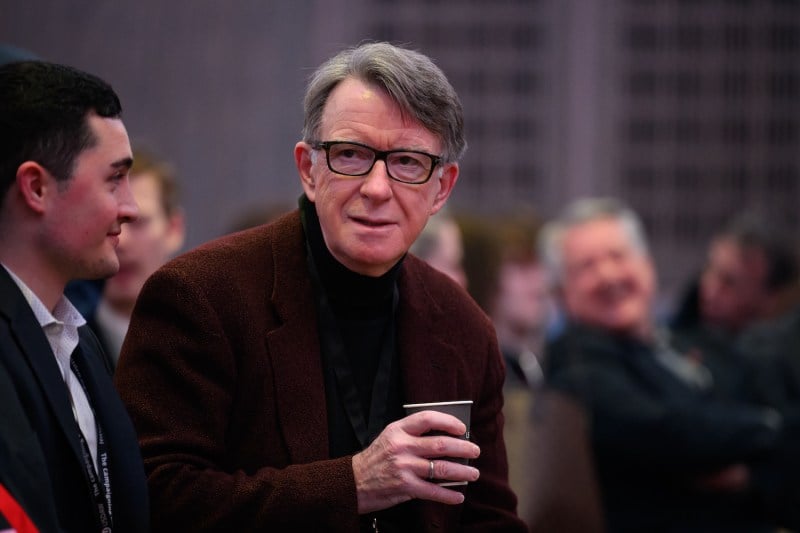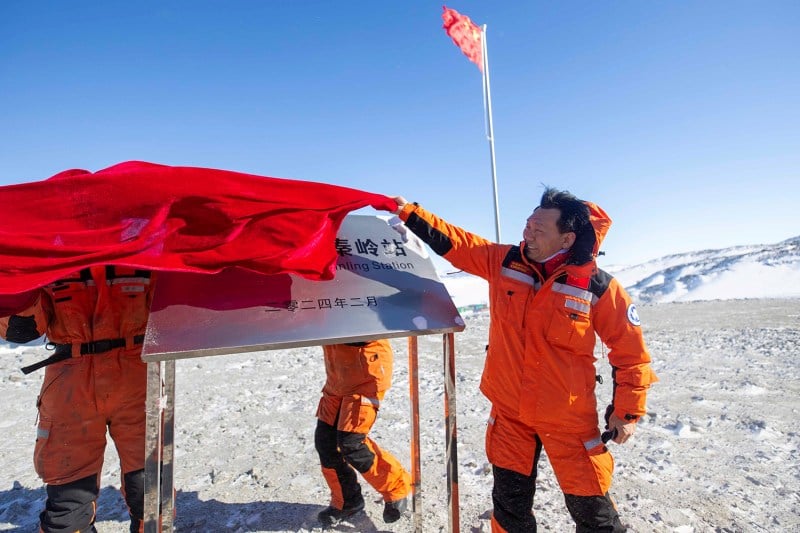Britain’s Machiavellian Answer for Trump

Britain’s Machiavellian Answer for Trump
Why the British government tapped its “prince of darkness” as its new U.S. ambassador.
Peter Mandelson is seen ahead of an opening speech by Keir Starmer at the London Labour Party Conference at Leonardo Royal Hotel on January 28, 2023 in London. Leon Neal/Getty Images
Look in a thesaurus for a synonym for “tumultuous,” and they all apply to Peter Mandelson’s career: “rollercoaster” may be one, “checkered” may be another. If you were being a little less dramatic, you might simply say “eventful.” The 71-year-old has been a spin doctor, government minister, European commissioner, member of the United Kingdom’s House of Lords, commercial advisor to Russians and the Chinese. Now, he’s set to become Britain’s ambassador to Washington.
Why would a British government, perennially desperate to claim best-buddy status with the United States, send a man as risky as Mandelson at a time like this? That’s because a man as vain and unpredictable as U.S. President Donald Trump might end up getting along with a man that used to be called the “prince of darkness.” At least, that’s the calculation of British Prime Minister Keir Starmer, who, like most leaders of the Western world, is waiting with trepidation for the president’s next step.
Look in a thesaurus for a synonym for “tumultuous,” and they all apply to Peter Mandelson’s career: “rollercoaster” may be one, “checkered” may be another. If you were being a little less dramatic, you might simply say “eventful.” The 71-year-old has been a spin doctor, government minister, European commissioner, member of the United Kingdom’s House of Lords, commercial advisor to Russians and the Chinese. Now, he’s set to become Britain’s ambassador to Washington.
Why would a British government, perennially desperate to claim best-buddy status with the United States, send a man as risky as Mandelson at a time like this? That’s because a man as vain and unpredictable as U.S. President Donald Trump might end up getting along with a man that used to be called the “prince of darkness.” At least, that’s the calculation of British Prime Minister Keir Starmer, who, like most leaders of the Western world, is waiting with trepidation for the president’s next step.
Mandelson cleaves toward the powerful. He is not alone in doing that, but he makes it an art form. He flatters those he deems important and puts down those he deems are not. His abiding principle is to ensure that he is always at the top table.
The British ambassador’s residence on Massachusetts Avenue is barely a 10-minute drive to the White House. The restored Lutyens building is nearly a century old and one of Washington’s prestige social venues—or, at least, that’s what Brits like to think. On one occasion when I was there, the envoy of the moment had placed photographs on the mantelpiece of the main drawing room of himself with, inter alia, the Clintons and the Clooneys. The message was: “Look, everyone, we still count.”
Washington is considered the pinnacle of most professional diplomatic careers, which is why Starmer’s decision to make the first political appointment by the U.K. to D.C. in five decades raised so many eyebrows. Before losing the general election last July, then-Prime Minister Rishi Sunak had announced the appointment of Tim Barrow, a figure straight out of central casting. With his waistcoat and watch chain, Barrow cut an old-fashioned dash, but his unctuous support of all things Brexit and conservative leadership was seen as just a little too opportunist. The straight-talking incumbent, Karen Pierce, who had held the ambassador position since 2020, had earned the respect of the Trump clan; her term had been extended by several months to cover the transition from former President Joe Biden to Trump, but her time was up.
Among those who were discussed as possible successors was David Miliband, a former British foreign secretary. He would have been a popular choice at the Foreign Office in Whitehall. He would have been an obvious choice had then-Vice President Kamala Harris won the U.S. presidential election. But Starmer’s concern, whether it was right or wrong, was that Miliband might be seen as too representative of the diplomacy from the era of former British Prime Minister Tony Blair and former U.S. President Bill Clinton. Cue Mandelson, a man who seems to have no problem with strongmen and is prone to calling poor performers “numpties,” which is originally a Scottish derivative of “numbskull.”
In the period between the U.S. election and Trump’s inauguration, as Starmer struggled to make up his mind, Mandelson somewhat privately touted his availability while publicly denying he was in the frame. It was suggested that his appointment was being resisted by Foreign Secretary David Lammy, who feared one of his own job’s key roles—guiding the so-called “special relationship” between the U.K. and the United States through a second Trump term—would be snatched from him by a bigger personality. Lammy had already lost responsibility for European Union negotiations to another cabinet minister, while a major player from the ancient regime—Blair’s former chief of staff, Jonathan Powell—was recently appointed as the U.K.’s national security advisor.
Although Mandelson and Starmer haven’t known each for long (Starmer is conspicuous for not being one of the foot soldiers of the Blair era), Mandelson has an important ally in the prime minister’s chief of staff, Morgan McSweeney. Also, the possibility of his appointment to Washington was praised by none other Nigel Farage, leader of the surging right-wing populist Reform Party and close to Trump, which was another factor in Mandelson’s favor.
On the surface, Mandelson may not be natural material for the MAGA clan. As a liberal, internationalist, and pro-European free trader, it could be said that he personifies what Republicans in the United States dislike about Europe. Mandelson’s past statements were quoted back to him in the press—calling Trump a “bully,” “reckless,” and “danger to the world.” Chris LaCivita, one of Trump’s campaign aides, subsequently described Mandelson as “an absolute moron.”
A few days after Trump’s hyperactive start as president, Mandelson performed a 180-degree turn. “I consider my remarks about President Trump as ill-judged and wrong. I think that times and attitudes toward the president have changed since then,” he said on Fox News. “I think people have been impressed not just by the extraordinary second mandate that he has received from the American people, but the dynamism and energy with which he approached not just the campaign but government, as well.”
Mandelson and Starmer do not need reminding of the fate of a previous ambassador. Kim Darroch was hounded out of Washington in 2019, after confidential messages he had written to London describing the Trump administration as “dysfunctional” and “inept” found themselves in the public domain. One can assume they were released by a pro-Trump mole in London, but leak investigations in Whitehall have a habit of not finding the culprit.
Raised in London, with Polish Jewish heritage, and grandson of Herbert Morrison—one of the totemic figures of Labour Party’s 1945 government—Mandelson first came to notice as the producer of a political TV show while in his late 20s. He was swiftly appointed director of communications for the Labour Party by its leader at the time, Neil Kinnock. Although the party remained in the wilderness during the height of Prime Minister Margaret Thatcher’s time, Mandelson’s media skills were highly praised. He gained a seat in Parliament in 1992, becoming close to a young Blair as he ascended to the Labour throne.
Although he tried continuously to manufacture positive headlines for Blair, Mandelson was rarely out of the headlines himself. He was forced to resign from his position as trade secretary in December 1998, after he had failed to disclose a home loan from a wealthy Parliament member. Just 10 months later, however, he was back in the cabinet as the Northern Ireland secretary. This, too, was short-lived. In early 2001, he resigned again after it was revealed he had used his influence to broker a British passport for someone who donated approximately $1 million to the Millennium Dome, a costly building by the River Thames that became synonymous with the hubris of the New Labour years.
In 2004, Mandelson was appointed as Britain’s European commissioner for trade. Four years later, he returned to the British government—this time under Gordon Brown, who had finally prevailed in ousting Blair. Mandelson was awarded a peerage and the grand title of president of the board of trade. His skills in this technical area of policymaking will have been a major factor in Starmer’s decision to appoint him as Trump mulls adding the U.K. to his punitive tariff list.
After Labour’s fall from power, Mandelson focused on his career in business, forming a lucrative consultancy called Global Counsel. That business developed links with the global wealthy, including those from Russia and China. He was also named in court papers as having had a close relationship with Jeffrey Epstein and Prince Andrew.
The normally risk-averse Starmer is taking one with Mandelson, whose appointment marks an astonishing comeback for a man who has survived more setbacks than most. But if he ends up using his dark arts to navigate Trump to the U.K. government’s benefit, it will be deemed as an inspired choice.
John Kampfner is the author of Why the Germans Do It Better: Notes from a Grown-Up Country.
More from Foreign Policy
-

Russian President Vladimir Putin looks on during a press conference after meeting with French President in Moscow, on February 7, 2022. The Domino Theory Is Coming for Putin
A series of setbacks for Russia is only gaining momentum.
-

The container ship Gunde Maersk sits docked at the Port of Oakland on June 24, 2024 in Oakland, California. How Denmark Can Hit Back Against Trump on Greenland
The White House is threatening a close ally with a trade war or worse—but Copenhagen has leverage that could inflict instant pain on the U.S. economy.
-

Donald Trump speaks during an event commemorating the 400th Anniversary of the First Representative Legislative Assembly in Jamestown, Virginia on July 30, 2019. This Could Be ‘Peak Trump’
His return to power has been impressive—but the hard work is about to begin.
-

US Secretary of State Marco Rubio greets employees at the State Department in Washington, DC, on January 21, 2025. The National Security Establishment Needs Working-Class Americans
President Trump has an opportunity to unleash underutilized talent in tackling dangers at home and abroad.










Join the Conversation
Commenting on this and other recent articles is just one benefit of a Foreign Policy subscription.
Already a subscriber?
.
Subscribe
Subscribe
View Comments
Join the Conversation
Join the conversation on this and other recent Foreign Policy articles when you subscribe now.
Subscribe
Subscribe
Not your account?
View Comments
Join the Conversation
Please follow our comment guidelines, stay on topic, and be civil, courteous, and respectful of others’ beliefs.
Change your username |
Log out
Change your username:
CANCEL
Confirm your username to get started.
The default username below has been generated using the first name and last initial on your FP subscriber account. Usernames may be updated at any time and must not contain inappropriate or offensive language.